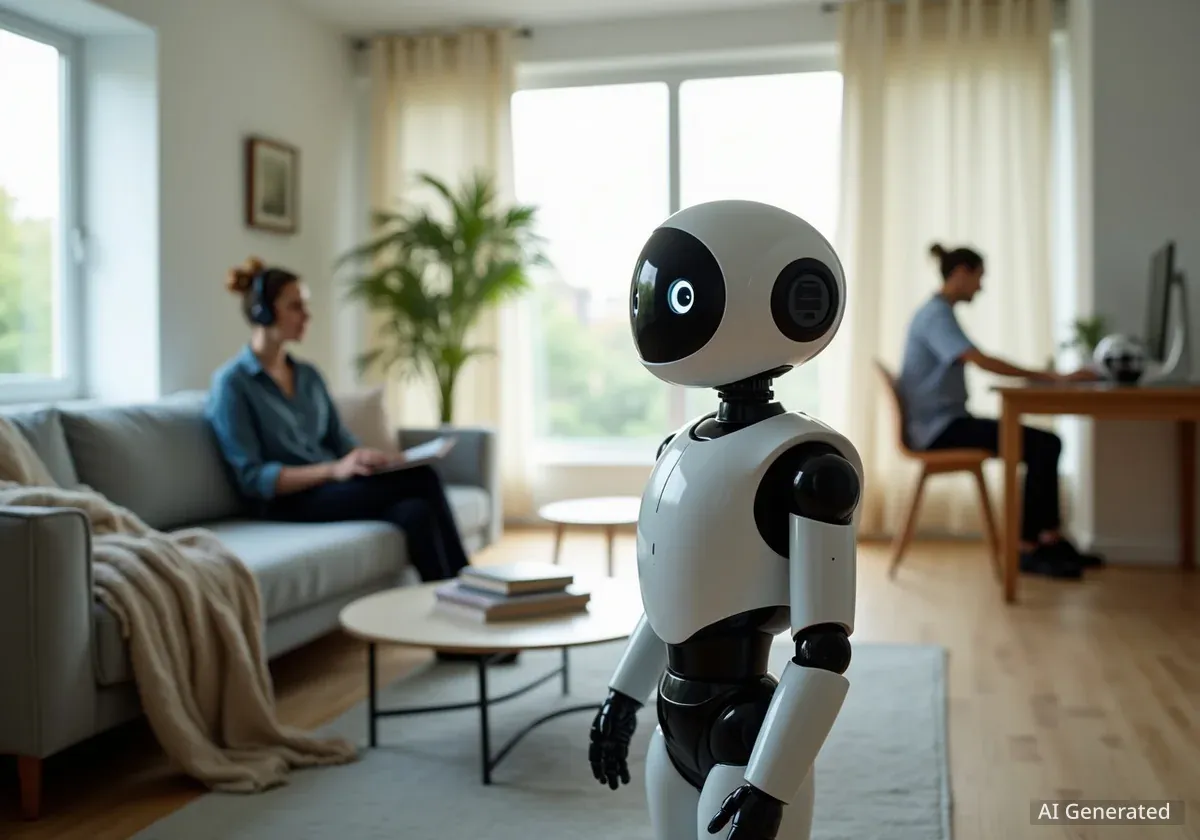A California-based robotics company, 1X, has opened pre-orders for its new humanoid robot, NEO, designed to assist with household chores. The robot, priced at $20,000 for early adopters, will initially rely on human teleoperators who will remotely control the machine and see inside customers' homes to gather training data for its artificial intelligence system.
Shipments are scheduled to begin next year, with the company stating this human-in-the-loop approach is essential for the robot to learn complex and personalized tasks beyond its basic autonomous functions.
Key Takeaways
- 1X is accepting pre-orders for its NEO humanoid robot, designed for home assistance.
- Early models will be partially controlled by remote human operators to train the AI.
- Customers must consent to operators viewing their homes through the robot's camera.
- The robot costs $20,000 for early purchase or $499 per month via subscription.
- Privacy controls include scheduling operator access and setting no-go zones.
The Human Element in AI Training
The NEO robot represents a new approach to deploying domestic robotics, blending autonomous capabilities with direct human oversight. While the machine will be able to perform simple actions on its own, such as opening doors or fetching objects, its ability to learn more sophisticated chores depends entirely on data collected from real-world environments.
Bernt Børnich, CEO of 1X, explained that this data collection is a necessary step in the AI's development. In the initial phase, a significant portion of the robot's actions will be guided by these remote operators.
"If we don't have your data, we can't make the product better," Børnich stated, emphasizing the trade-off between privacy and advancing the robot's capabilities.
This model requires early adopters to be comfortable with a novel form of in-home service, where a person remotely operates a physical machine within their private space. The goal is for the AI neural network to observe these human-guided actions and eventually replicate them autonomously.
Pricing and Availability
- Upfront Cost: $20,000 for early access.
- Subscription: $499 per month.
- Pre-order Deposit: $200.
- Shipping Begins: Next year.
Addressing Privacy and Security Concerns
The concept of a remote operator accessing a camera inside a private home raises immediate privacy questions. 1X has stated it is implementing several features to give owners control over this process and mitigate potential intrusions.
Owners will use a dedicated application to manage the robot. Through this app, they can schedule specific times for a teleoperator to take control and clearly define the tasks they want performed. This ensures that human intervention only happens with the owner's explicit and scheduled permission.
Built-in Safeguards
To further protect privacy, the system will offer several safeguards. According to the company, owners can designate specific areas of their home as "no-go zones," which the robot and its operator will be restricted from entering. Additionally, 1X has mentioned the ability to blur people from the operator's view, preventing them from being personally identified.
Børnich also assured that NEO is equipped with multiple layers of security designed to prevent unauthorized access or malicious actions that could cause harm. However, the reliance on remote human access introduces a new vector for potential security breaches that customers will need to consider.
What is Teleoperation?
Teleoperation is the remote control of a robot or machine from a distance. In the case of NEO, a human operator uses a control interface to see what the robot sees and manipulate its movements to perform tasks like tidying a room or preparing a simple meal. This data is then used to train the robot's AI to perform these tasks on its own in the future.
How NEO Works in the Home
The NEO robot is designed to integrate into a household and become a functional assistant. Available in tan, gray, and dark brown, its humanoid form allows it to interact with an environment built for people, such as opening standard doors and handling common household items.
Upon its release, NEO will handle a set of pre-programmed autonomous tasks. These include:
- Opening and closing doors
- Fetching and carrying small items
- Turning lights on and off
For any task more complex than these basics, the owner will need to request assistance through the app. For example, if a user wants NEO to tidy up the living room, they would schedule a session. At the appointed time, a teleoperator would connect to the robot, see the room through its camera, and guide its arms and movements to complete the chore.
Over time, the AI system is expected to learn from thousands of such sessions across many homes, gradually expanding its library of autonomous skills. The company's long-term vision is a robot that requires minimal human intervention, but the path to that future runs directly through the living rooms of its first customers.





